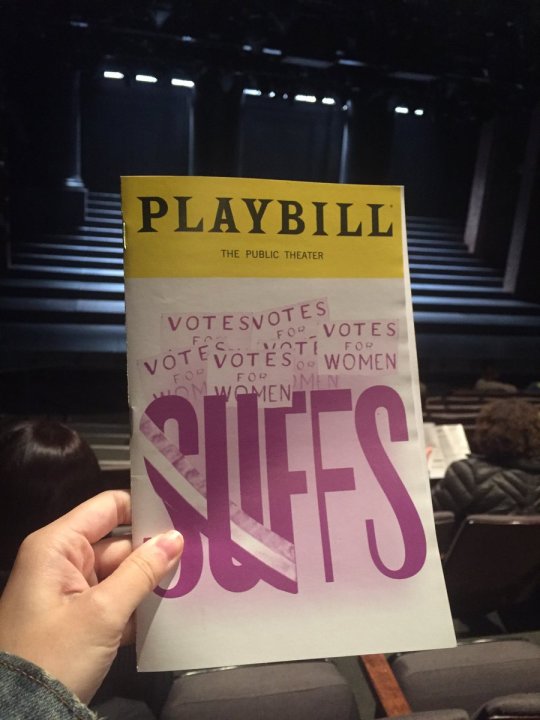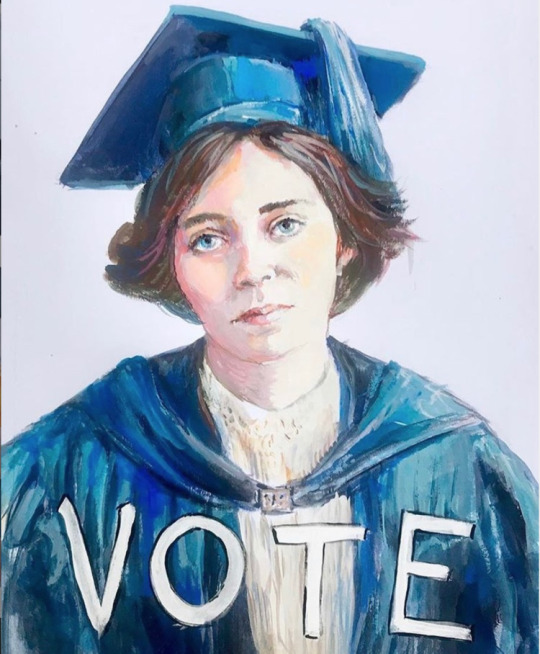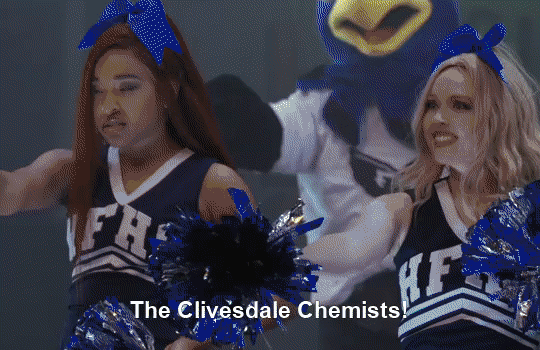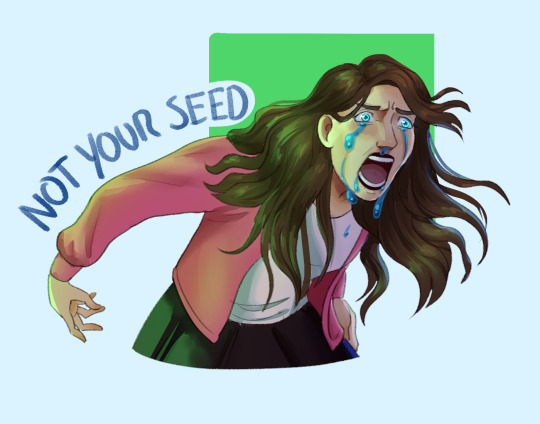#alice paul
Text

Alice Paul, American Suffragette and Author of an Equal Rights Amendment, 1910s
148 notes
·
View notes
Text
SUFFS Notes: So I've seen both the off-Broadway and Broadway version
2 years earlier, I experienced the Public version of Suffs (before Hillary Clinton and Malala Yousafzai got producer credits). I even own two press scripts.
The Broadway Suffs opening is "Let Mother Vote" and oh I did fell in love with this opening because of how well it established the Carrie's conservative formation and showed us just how seductive it can be. I also kinda miss the older version that opened with woman and non-binary performers dressed as anti-suffrage men making all these awful anti-suffs slogans. By dressing up as the patriachy, these women and non-binary actors really own the story. The Broadway version has less emphasis on ensemble anti-suffs.
Anyone who has seen the Broadway version know that President Woodrow Wilson (Grace McLean) can't stop singing about "Ladies" and their proper domestic place. Now the off-Broadway run has an comedic ironic payoff to this. President Wilson suddenly gets a chest pain, a stroke, and it is a silly moment (I remember the entire theatre laughing hard). We see a few blackouts of him suffering, and SUDDENLY COSTUME CHANGE, Grace McLean is standing there in a black dress, now playing First Lady Edith Wilson, who took up "Stewardship" when her husband was disabled by his stroke. So Edith starts signing some of his paperwork, ("tariff reform, YOUR FAVORITE") and she runs into a paper that says, "Support for Ratification of the Suffrage Amendment." The stage direction indicates she might be on the "verge of epiphany," and she wonders if she should support it, but then she's like "Absolutely NO!" and rips it. It's a funny way of indicating that just because a First Lady has a Presidential role, that doesn't mean she has empathy for women's rights.
I can see why they cut from the Public, but I do miss the silly transformation sequence of President Wilson‘s stroke and Edith Wilson’s stewardship. (Just cause a First Lady got handed power, doesn’t mean she’s gonna save you.)
One striking change is more conspicuous racial stratification in the cast whereas Aisha de Haas, a Black actor, played the white socialite/Tennessee mother at the Public. Light-skinned BIPOC play white characters, and the Broadway script/direction nods a little more when a dark-skinned BIPOC is in a white role.
For example, in the Broadway version, a Black Tsilala Brock plays the white Irish Dudley and President Wilson utters the lines, "honest for an Irishman!" to bring deliberate attention to the race-bent casting.
Also, the Filipino actress Jaygee Macapugay plays the white Mollie Hay. When Wilson says, "The south will never let ladies vote, let alone colored ladies, thank God," he condescendingly takes Mollie Hay by the waist and Jaygee scrunches this deliberately astonished expression at "colored ladies."
The Broadway version cuts out verses of an anonymous Chinese American suffrage who brought her baby to a march. So I went to the Broadway SUFFS with a Black woman seatmate (who never caught the older version) and she felt the musical didn't directly address other suffrage ethnicities outside of white women and Black women. Yes, there is a diversity of BIPOC people playing white suffrages in both versions (and other backgrounders of color are somewhat suggestive of unnamed suffrages of color who did exist), but now there's no longer a direct acknowledgment of Asian suffrages.
The Broadway did some good work to add a sequence of Inez Milholland (Hannah Cruz) working herself to the bone and exhausting herself across states, with a succession of banners signaling another location, leading to her tragic death. It hits way harder than the off-Broadway version (where Phillipa Soo played Inez).
The Broadway version of Suffs tightened some of the numbers. For example, "When We Are Married/If We Are Married" were separate private moments. The Broadway version combined them and juxtaposition the kisses between the heterosexual Dudley and Doris Stevens ("When We Are Married") with the clandestine lesbian Mollie Hay and Carrie Chapman Catt ("IF We Were Married").
Mollie and Carrie did not kiss in the older iteration. So the script goes from Mollie and Carrie "They want to kiss, but there are people around" to "both couples kiss." A moment where Mollie tells Carrie, "Carrie, it's getting late. Come upstairs" (a major hint of their relationship) was also not in the off-Broadway version.

#suffs#musical#broadway#I like both but also feel complicated about it#alice paul#shaina taub#women's suffrage
46 notes
·
View notes
Note
If you were to choose four new Presidents to be put onto a second Mount Rushmore, who would they be? Alternatively, who are four non-Presidents that you might choose?
That's a tough one. For the Presidents on the second Mount Rushmore, I think FDR would be a no-brainer. I think I'd also add Ulysses S. Grant and Dwight D. Eisenhower -- not solely because of their Presidencies, but due to their overall importance to American history. The last spot is the hardest to decide upon. I don't think I'd choose anyone who was in office more recently than Eisenhower. Maybe John Adams or James Madison?
As for the four non-Presidents, I'd go with General George C. Marshall, Martin Luther King Jr., Cesar Chavez, and either Alice Paul, Harriet Tubman, Elizabeth Cady Stanton, or Clara Barton.
#What if?#Mount Rushmore#Mount Rushmore II#History#Franklin D. Roosevelt#FDR#President Roosevelt#Ulysses S. Grant#General Grant#President Grant#Dwight D. Eisenhower#General Eisenhower#President Eisenhower#George Marshall#General Marshall#Leaders#Political Leaders#James Madison#President Madison#John Adams#President Adams#Cesar Chavez#Martin Luther King Jr.#MLK Jr.#Clara Barton#Alice Paul#Elizabeth Cady Stanton#Harriet Tubman
22 notes
·
View notes
Text
youtube
Finish the Fight, featuring Shaina Taub as Alice Paul, from Suffs
2 notes
·
View notes
Text

Alice Paul by Allison Adams
"Unless women are prepared to fight politically they must be content to be ignored politically."
Alice Paul (1885 -1977) was a leading civil rights activist and organizer responsible for the final push and success in winning passage of the 19th Amendment (woman suffrage) to the U.S. Constitution. After staging an 18 month long picket line outside the White House, she and many others were beaten and sentenced to prison for seven months (on the charge of “obstructing traffic”). In prison, she went on a hunger strike, but she was force-fed and temporarily institutionalized. Journalistic sympathy for their plight helped turn public and presidential support toward the cause, and in 1919, both the House and Senate passed the 19th Amendment...ending a 73-year battle for the right to vote.
#Alice Paul#Allison adams#herstory#women in history#art#artwork#civil rights#activists#women’s suffrage#suffragists#women’s rights#irl women/girls
4 notes
·
View notes
Photo

9 notes
·
View notes
Text
The chasm that separated '60s radicals from those who immediately preceded them is nicely illustrated by radical feminist Barbara Mehrhof's account of a disputatious encounter between first-and second-wave feminists. Mehrhof was part of a women's liberation group that organized a feminist action as part of the leftist Counter-Inaugural demonstration in January 1969. The purpose of their protest was to declare that suffragism, which they claimed had vitiated the earlier wave of feminism, was dead and that a new movement for genuine liberation was underway. In a display of remarkable chutzpah, they decided to contact the famous suffragist and founder of the National Women's Party, Alice Paul, to see if she would join them in "giving back the vote." As one might expect of someone who had endured jail for the suffrage cause, Paul was not interested in repudiating suffrage as "a sop for women." Indeed, when Shulamith Firestone asked her to join them on stage in burning their voter registration cards, Paul reportedly "hit the ceiling." To Paul, woman suffrage constituted a significant breakthrough in women's struggle for equality. But to women's liberationists who had acquired their political education in the civil rights movement and the new left, voting was a "mockery of democracy," and equality in a fundamentally unequal society an obscenity. Liberation, not equality, was their goal.
-Alice Echols, Daring to Be Bad: Radical Feminism in America: 1967-75
5 notes
·
View notes
Text
Fortitude, Memory, Connection

"The cardinal virtue of Fortitude represented by a seated woman, her right hand on a column (possibly a modern impression)" ca. 1480–1520
The cardinal virtue of fortitude is often depicted as a woman carrying in her arms a large column, from this imagery we can interpret the meaning of the virtue to be akin to something like "strength", or perhaps "perseverance". Indeed, with the latin root fortis meaning "strong", the woman carrying the column is demonstrating her physical strength. As a virtue however, fortitude requires another sort of inner strength, a solidity of will, or resilience in the face of challenge. Fortitude is not only a virtue in the sense that it allows us to be steadfast in cultivating our sense of morality, but in the vaster sense that it is a skill to be used in many instances which require it. Cultivating this virtue can be done simple with self practice, perhaps by setting personal goals like reading a book for a certain amount of time without getting distracted. This virtue could be demonstrated and practiced by standing up for oneself in our relationships, holding steadfastly to a belief, or even pushing for a bit more distance during a run when it feels like you want to give up.
The cultivation of a virtue like this is not only done by oneself, as with any virtue we need exemplars and role models on which to base our understanding of the virtues and our goals. When considering people that have the trait of fortitude, my mind first goes to suffragist Alice Paul. Among her accomplishments as a leader of the women's suffrage movement in the United States, she had endured great hardships to ensure that she remained strict in her conviction. She (along with other suffragist women) was sentenced to seven months in prison for "obstructing traffic" during a picketing protest. While she was in prison, she organized a hunger strike in which she was force fed through her nose after refusing to eat. I cannot imagine the intense strength of will which would be required to endure... A moral exemplar in more ways than one, Alice Paul embodies the virtue of fortitude for her strength of mind and solidity of her beliefs. Below is a photo of Alice Paul, as well as a link to a trailer for the movie "Iron Jawed Angels" which tells parts of Alice Paul's and the Suffragists' story.

Alice Paul raises glass in front of the ratification banner, August 26, 1920. National Women's Party Collection.
~~~
There is something to be said about the moral energy surrounding the virtue of fortitude, is is an idea which we can cultivate within ourselves by taking note of the ways in which virtuous people (like Alice Paul) have demonstrated it. We know that fortitude is not a virtue only expressed in dire situations (though it can be), it can be practiced and cultivated within our daily routines and interactions with others. And while fortitude can serve a larger purpose as a great, heroic example of strength, it also serves as a way to enrich our lives personally by serving a human "need". So what is this "need" that fortitude fills? I believe that it can differ between people based on the ways in which it is cultivated and utilized. The cultivation of fortitude can fulfill the need to belong and have meaning; as we fortify our beliefs and character, we become more sure of ourselves and our place in the world. Cultivating fortitude can promote the feeling of accomplishment in instances of it's utilization, in those moments where we did succeed in reading for an hour straight without checking our phone, or where we navigated a negative experience calmly and with resilience. We see the personification of fortitude with her heavy stone column, we see that she is enduring, and that brings about inspiration that we too can persevere under the weight of our own hardships.
To find examples of fortitude in history, one must look to those figures that believed steadfastly in a cause, a movement, a message. This may seem a loose guideline for a search, but those that create change are often people that had to show great fortitude whilst working towards it. In seeing "Fortitude" on the list of virtues on the Forward into Memory website, my first thought was of a woman named Yu Gwan-soon (유관순). She was a student at Ehwa Women's University who participated in protests for Korean independence in 1919. Yu Gwan-soon was jailed at the age of 17 for her role in the protests where she was subsequently tortured and killed. While in prison, she advocated for her own release, and the release of the other prisoners, and even organized a protest within the prison. A profound example of one exemplifying the virtue of fortitude, while in prison she writes "...this physical pain does not compare to the pain of losing my nation". I first learned about Yu Gwan-soon this year during my visit to the Seodaemun Prison Museum in Seoul, South Korea where I was able to stand in the cell in which she was imprisoned, and learn of her story. Here is a link to an article about Yu Gwan-soon and her life). The photos below are photos that I took from the outside of her cell, and of a piece of art in the museum memorializing her.


Continuing on my "entrance of the forest" of persons of fortitudinous virtue, I clicked on the page of a woman named Kim Nansa (김란사). She was a Korean woman who desired enlightenment and knowledge, she applied to Ehwa University, and was denied as married women were not allowed to enroll. Upon this denial, she showed great fortitude in pursuing enlightenment, she is quoted as replying to the school's rejection with the words: “My life is pitch-black like in the middle of the night. Would you give me a chance to find light?”, a compelling statement that moved the school to accept her as a student. After further reading and watching a speech by Professor Hope May (which can be found here) I discovered that Kim Nansa was the professor and mentor of Yu Gwan-soon, as well as the leader of a student club discussing national liberation. Perhaps this is not a solid set of directions that will lead one to the entrance of the forest, but rather an example that these connections, the red thread of memory, between virtuous people and events can be found in many places along the way.
#Fortitude#Alice Paul#cardinal virtues#Yu Gwan-soon#Kim Nansa#Seodaemun Prison Museum#March First Movement
6 notes
·
View notes
Text
ALICE PAUL // SUFFRAGIST
"She was an American Quaker, suffragist, feminist, and women's rights activist, and one of the foremost leaders and strategists of the campaign for the Nineteenth Amendment to the U.S. Constitution, which prohibits sex discrimination in the right to vote. Paul initiated, and along with Lucy Burns and others, strategized events such as the Woman Suffrage Procession and the Silent Sentinels, which were part of the successful campaign that resulted in the amendment's passage in August 1920."


0 notes
Text
Friday June 22nd was the date of the first arrest of women in the US picketing for the right to vote.
I’m not from the US but a lot of women here are and I would like to propose to you to have a celebration of women who have been daring in the service of women on that day.
Doesn’t have to be voting.
Doesn’t have to be a big name.
Doesn’t have to be organised.
Just find an example of a woman who has been daring for women & share it on that day.

1 note
·
View note
Text
19: The Musical audiobook. A REVOLUTIONARY experience in entertainment!
A REVOLUTIONARY experience in entertainment!
19: The Musical
“The idea for “19” was inspired by a line in Hamilton: “When I meet Thomas Jefferson, I’ma compel him to include women in the sequel.” That line struck me because I thought, “Where’s the sequel? We’re still waiting to be heard — and I’m going to do something about that right now.”- Jennifer Schwed and Doug Bradshaw
As many of you who…

View On WordPress
#Alice Paul#Audiobook#Carrie Chapman Catt#Doug Bradshaw#Equal Rights#Ida B. Wells#Inez Milholland#Jennifer Schwed#Musical#Revolution#Susan B. Anthony#Women Suffrage Movement
0 notes
Text
*screaming at the top of my lungs* HEY YOU KNOW HOW IN TGWDLM PAUL USED TO BABYSIT ALICE? WELL YOU ALSO KNOW HOW IN BLACK FRIDAY PAUL ACCIDENTALLY CALLS TIM "PETE"?

DO YOU THINK PAUL EVER BABYSAT PETE FOR TED??? DO YOU?????? CAUSE I DO!
#tgwdlm#paul matthews#tim houston#alice woodward#peter spankoffski#ted spankoffski#team starkid#starkid#hatchetverse#hatchetfield#paul tgwdlm#starkid black friday#black friday musical#the guy who didn't like musicals
1K notes
·
View notes
Text
youtube
Show Them Who You Are, featuring Shaina Taub as Alice Paul and Hannah Cruz as Inez Milholland, from Suffs
0 notes
Text







Running Gags in Hatchetfield Musicals pt 6 | Hating Clivesdale (fuck em)
#StarKid#hatchetfield#npmd#npmd spoilers#nightmare time#hatchetfield musicals#tgwdlm#watcher world#forever and always#Kim’s face in the last one 😂#honey queen#nerdy prudes must die#the guy who didn't like musicals#team starkid#paul matthews#emma perkins#bill woodward#alice woodward#dan reynolds#zoey chambers
4K notes
·
View notes
Text





THE APOTHEOSIS IS UPON US!
#EMMA! LET ME PUKE IN YOUR MOUTH#the guy who didn't like musicals fanart#the guy who didn't like musicals#tgwdlm#tgwdlm fanart#paul matthews#emma perkins#ted spankoffski#alice woodward#team starkid#starkid#starkid fanart#hatchetfield
1K notes
·
View notes
Text






House of the Dragon (2022 - ) // Dune (2021)
#forgot i had this in my drafts lmao#but i'm posting it because the coloring match and i'm kinda proud of it 😌#aegon ii targaryen#alicent hightower#house of the dragon#hotd#hotdedit#jessica atreides#paul atreides#dune#duneedit#**
1K notes
·
View notes